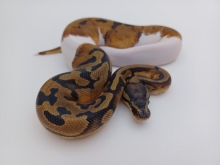
A second chance to protect wetlands
Wetlands are among the most threatened ecosystems in the world. A new study, published in Nature, has found that the loss of wetland areas around the globe since 1700 has likely been overestimated. This is good news overall, however, the global picture hides significant variations, with several regions and distinct wetland types under significant levels of pressure.

How our own identity impacts how we judge others
How does our own identity impact how we perceive and judge others? Research from McGill University has found that those who are most likely to be stereotyped based on their combined racial and gender identity, such as Black women and Asian men, were less likely to hold certain stereotypes against others.

A new understanding of reptile colouration
Snakes and mice don’t look alike. But much of what we know about skin colouration and patterning in vertebrates generally, including in snakes, is based on lab mice. However, there are limits to what mice can tell us about other vertebrates because they don’t share all of the same types of colour-producing cells, known as chromatophores. For example, snakes have a type of chromatophore called iridophores that can generate iridescent colours by reflecting light.

How does vaping affect the lungs?
Teen vaping has been on the rise, with reports of rapidly increasing use across North America. While some consider vapes to be a useful tool for smoking cessation, new research from the Research Institute of the McGill University Health Centre (RI-MUHC) supports a growing public health concern about potential adverse health consequences.

Using AI to predict recurring lung cancer
Lung cancer is the leading cause of cancer-related deaths in Quebec and Canada, killing more individuals than prostate, colon and breast cancers combined.

How immune cells generated neonatally protect our lungs throughout our lifetime
Every day, humans breathe in 11,000 litres of air. But this essential act also means we inhale microorganisms, particles, and pollutants. A new study from the Research Institute of the McGill University Health Centre (RI-MUHC) has revealed how the unique immune cells that are developed in the embryo protect our lungs from environmental challenges throughout the course of our lifetime.

Reducing mental health stigma in junior hockey
For professional athletes, the pressures of competition and stigma surrounding mental health issues can be debilitating to the point where some are leaving the arena for good. Young hockey players are no exception. Fear of negative career repercussions can mean athletes avoid disclosing their mental health concerns.

A Cree-speaking Alexa bot?
Indigenous communities across the globe are fighting to retain their languages, which serve as means through which cultures, knowledge and traditions are preserved and transmitted between generations.

How should Montreal’s high schools be reformed?
If you could redesign high school, what might you change? Like most educational institutions across Canada, Montreal’s English high schools retain structures from the time of the industrial revolution. As the realities of students’ lives have transformed, schools are slowly adapting to a knowledge-based economy and unpredictable ecological and social challenges.

McGill research reveals positive impact of CMHA Ontario’s Talk Today program in Canadian Junior Hockey League
A new report by McGill University Faculty of Education researchers shows Canadian Mental Health Association (CMHA), Ontario’s Talk Today program is making a positive impact on athletes in the Canadian Junior Hockey League (CJHL).

What crocodile DNA reveals about the Ice Age
What drives crocodile evolution? Is climate a major factor or changes in sea levels? Determined to find answers to these questions, researchers from McGill University discovered that while changing temperatures and rainfall had little impact on the crocodiles’ gene flow over the past three million years, changes to sea levels during the Ice Age had a different effect.

Astronomers capture radio signal from distant galaxy
How do stars form in distant galaxies? Astronomers have long been trying to answer this question by detecting radio signals emitted by nearby galaxies. However, these signals become weaker the further away a galaxy is from Earth, making it difficult for current radio telescopes to pick up.

How COVID-19 changed our grocery habits
To better understand food-related decisions during the pandemic, a team of McGill researchers, including School of Human Nutrition Professor Daiva Nielsen and postdoctoral fellow Katherine Labonté, conducted an online survey among a sample of adults from Quebec to compare grocery shopping behaviours in 2019 and 2020. The study showed that at the beginning of the pandemic, people reduced the frequency of in-store shopping expeditions.

Illegal remixes: Law-breaking or creative license?
In the electronic dance music (EDM) community, what is viewed as intellectual property theft isn’t always up to the law—it’s up to the community. Norms around unlawful activities, such as illegal remixing, are often ambiguous and situation-specific. Ironically, illegal remixes can garner support, even career-launching acclaim.

Flying cars? Not so fast
Certain tech companies are promising dazzling futures when it comes to transportation, like Uber’s vision of skies buzzing with helicopter-like flying cars, and Elon Musk’s design for layers upon layers of automobile tunnels below city streets.

